
Tilia americana is a species of tree in the family Malvaceae, native to eastern North America, from southeast Manitoba east to New Brunswick, southwest to northeast Oklahoma, southeast to South Carolina, and west along the Niobrara River to Cherry County, Nebraska. It is the sole representative of its genus in the Western Hemisphere, assuming T. caroliniana is treated as a subspecies or local ecotype of T. americana. Common names include American basswood and American linden.
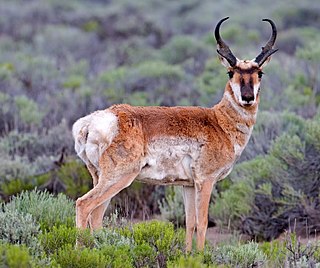
The pronghorn is a species of artiodactyl mammal indigenous to interior western and central North America. Though not an antelope, it is known colloquially in North America as the American antelope, prong buck, pronghorn antelope and prairie antelope, because it closely resembles the antelopes of the Old World and fills a similar ecological niche due to parallel evolution. It is the only surviving member of the family Antilocapridae.

Microvelia is a genus of aquatic bugs in the family Veliidae. There are at least 230 described species in Microvelia.

Trepobates pictus is a species of water strider in the family Gerridae. It is found in eastern North America from Texas to Florida, Illinois, Maine, and Ontario.
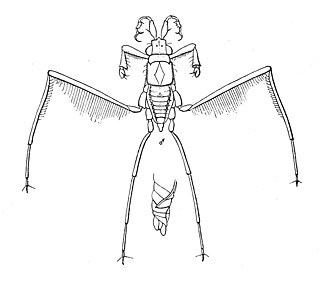
Rheumatobates rileyi is a species of water strider in the family Gerridae. It is found in North America. The genus Rheumatobates is characterized by males having antennae with hook like structures. Males grab females around the head using the antennae and lift them off the water surface. The hind femur appears twisted and a dense cluster of hears are found on the hind femur and tibia in males.
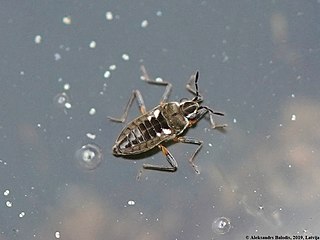
Microvelia buenoi is a species of smaller water strider in the family Veliidae. It is found in Europe & Northern Asia and North America.
Halobates sericeus, the Pacific pelagic water strider, is a species of water strider in the family Gerridae. It is found in Australia, the East Pacific, Indo-West Pacific, North America, Oceania, and temperate Asia.
Gerris comatus is a species of water strider in the family Gerridae. It is found in North America.

Hippodamia americana, the American lady beetle, is a species of lady beetle in the family Coccinellidae. It is found in North America.
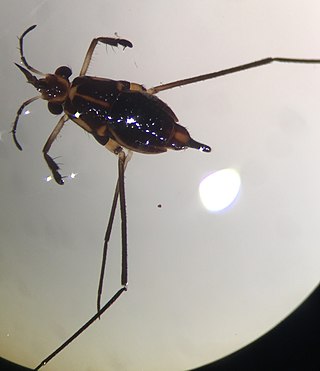
Rheumatobates vegatus is a species of water strider in the family Gerridae. It is found in the Caribbean Sea, Central America, and North America.
Gerris marginatus is a species of water strider in the family Gerridae. It is found in Central America, North America, and South America.
Gerris pingreensis is a species of water strider in the family Gerridae. It is found in North America.

Aquarius conformis is a species of water strider in the family Gerridae. It is found in eastern North America from Quebec west to Wisconsin and south to Florida and Mexico.
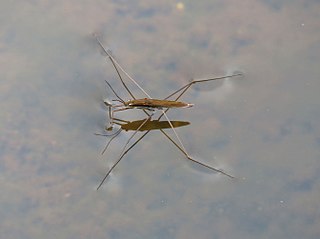
Limnoporus notabilis is a species of water strider in the family Gerridae. It is found in North America.

Microvelia pulchella is a species of smaller water strider in the family Veliidae. It is found in the New World.
Platyvelia brachialis is a species of smaller water strider in the family Veliidae. It is found in the Caribbean, Central America, North America, and South America.
Cymatia americana is a species of water boatman in the family Corixidae. It is found in North America.

Microvelia macgregori is a species of true bug in the family Veliidae. It is semi-aquatic, living on the surface of water in freshwater habitats in New Zealand.
Microvelia karunaratnei is a species of smaller water strider in the family Veliidae. It has only been recorded in Sri Lanka and is one of the few veliid species known to inhabit tree holes.
Microvelia cavicola is a species of smaller water strider in the family Veliidae. It has only been recorded in Panama and is one of the few veliid species known to inhabit tree holes.











